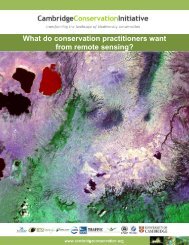CONSERVING BIODIVERSITY & DELIVERING ECOSYSTEM SERVICES
conserving biodiversity & delivering ecosystem services
conserving biodiversity & delivering ecosystem services
You also want an ePaper? Increase the reach of your titles
YUMPU automatically turns print PDFs into web optimized ePapers that Google loves.
Payments for Ecosystem Services<br />
Payment for Ecosystem Services (PES) is the term used to<br />
describe an arrangement where a transaction occurs<br />
through which beneficiaries of a service (or bundles of<br />
services) buy from the providers of that service. People<br />
who benefit from a service therefore compensate those<br />
who provide it, giving them an incentive to manage land<br />
and resources in a way that ensures its continued<br />
provision. Although this concept is simple in theory,<br />
establishing effective and equitable PES schemes is<br />
difficult in practice, and there are relatively few local<br />
examples. Some national PES schemes have been<br />
established elsewhere, with varying levels of success.<br />
Costa Rica provides one of the best known examples for<br />
developing countries. Payments from the Government<br />
are made to farmers who conserve forests on their land to<br />
protect watersheds, biodiversity, carbon sequestration<br />
and storage, and scenic landscape/tourism services.<br />
Currently, PES schemes are often dependent on funding<br />
from multilateral agencies (such as the World Bank and<br />
Global Environmental Facility) though funds can also be<br />
levied from national taxes or from private companies. For<br />
example, there are many companies that sell carbon<br />
credits to commercial and individual customers who are<br />
interested in lowering their carbon footprint on a<br />
voluntary basis. Increasingly, conservation is looking<br />
towards businesses to provide the finance needed to<br />
conserve biodiversity and ecosystem services due to their<br />
high impact on the environment and dependency on it.<br />
At the international level, some businesses and<br />
Governments are becoming engaged in long-term,<br />
sustainable financing for conservation through PES<br />
schemes, such as the REDD+ mechanism (Reducing<br />
Emissions from Deforestation and Forest Degradation)<br />
currently in development.<br />
Assessing services, such as the<br />
carbon stored in Shivapuri<br />
Nagarjun National Park, can<br />
help to inform land management<br />
that reflects the value of<br />
natural capital (Hum Gurung)<br />
National accounting systems<br />
measure the economic<br />
activity of a nation as an<br />
indicator of progress. They<br />
take account of physical and<br />
financial capital as assets,<br />
but generally overlook the<br />
natural capital that our<br />
environment provides.<br />
Similarly, national accounts<br />
fail to reflect social factors<br />
such as income distribution<br />
and poverty. However, there<br />
is a growing awareness of<br />
the importance and<br />
relevance of including<br />
ecosystem services in<br />
decision-making, and a<br />
move towards ‘green accounting’ which recognises the<br />
economic value of nature by measuring ecosystem services<br />
(such as clean water, clean air and greenhouse gas<br />
sequestration), in addition to traditional measures of the<br />
market value of a country’s goods and services. The concept<br />
of a Green Economy, i.e. an economic model based on<br />
sustainable development that takes account of the values of<br />
natural resources, has the potential to result in policies that<br />
improve human well-being and social equity, while<br />
significantly reducing environmental risks and ecological<br />
scarcities. This will only be achieved if there is investment to<br />
maintain and enhance ecosystems; however, in some cases,<br />
income can also be generated from the provision of<br />
ecosystem services (see box).<br />
Protected areas often provide important benefits for local people,<br />
such as the community of Murma village near Rara National Park<br />
who collect pine needles from the forest to combine with manure<br />
to fertilise their fields. Without pine needles their crop yield<br />
would decrease (David Thomas)




